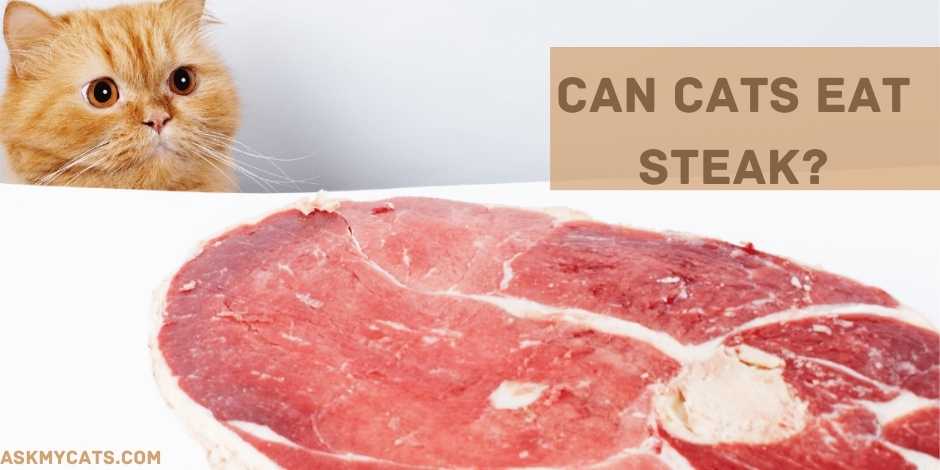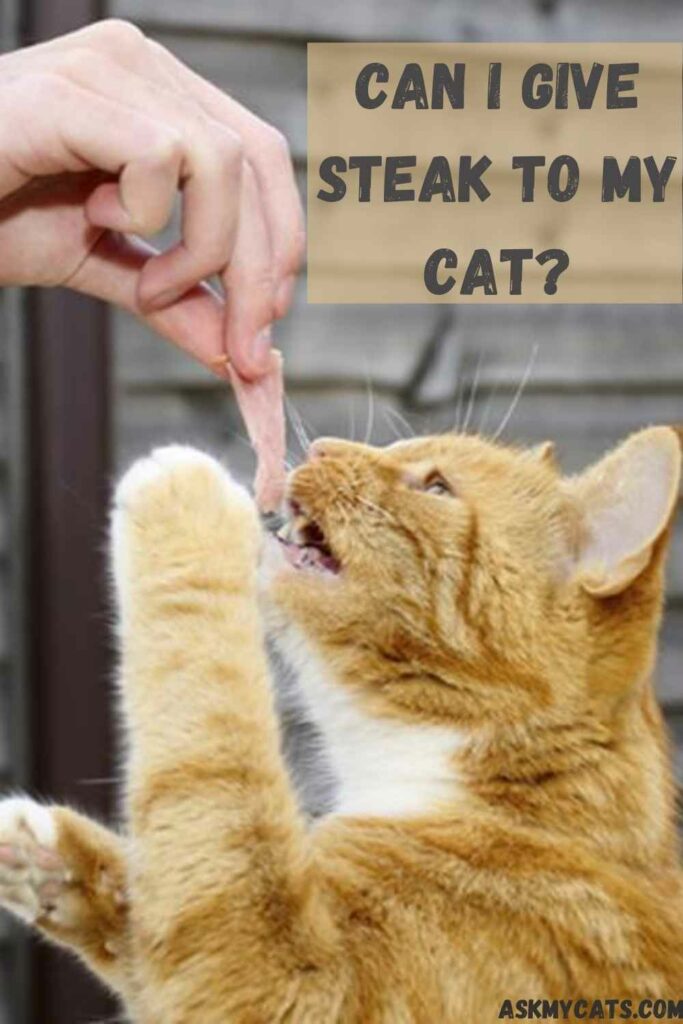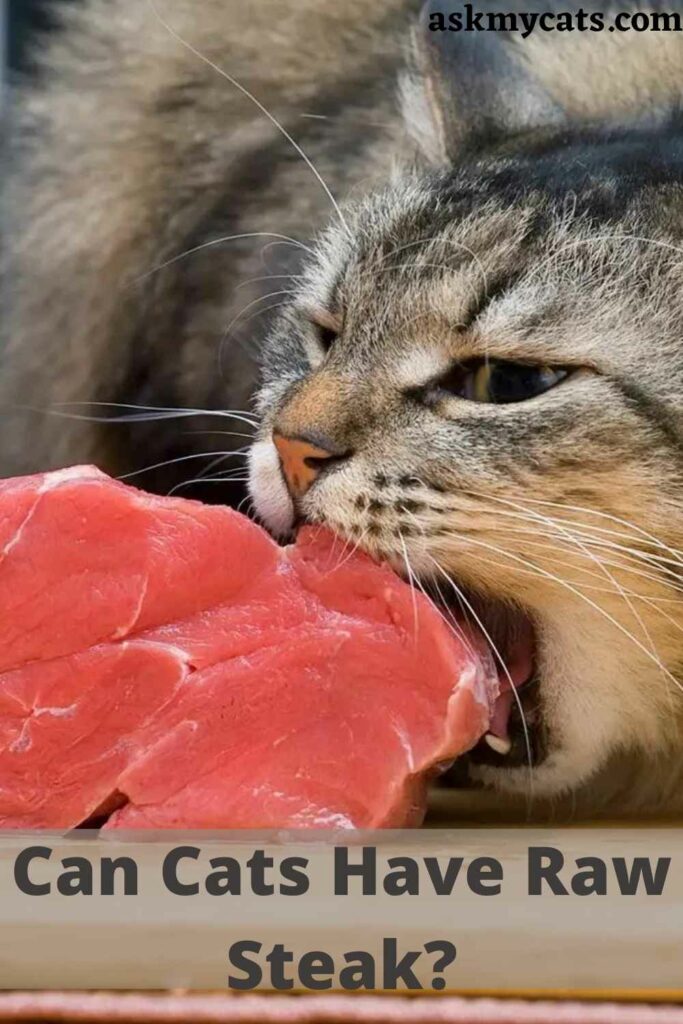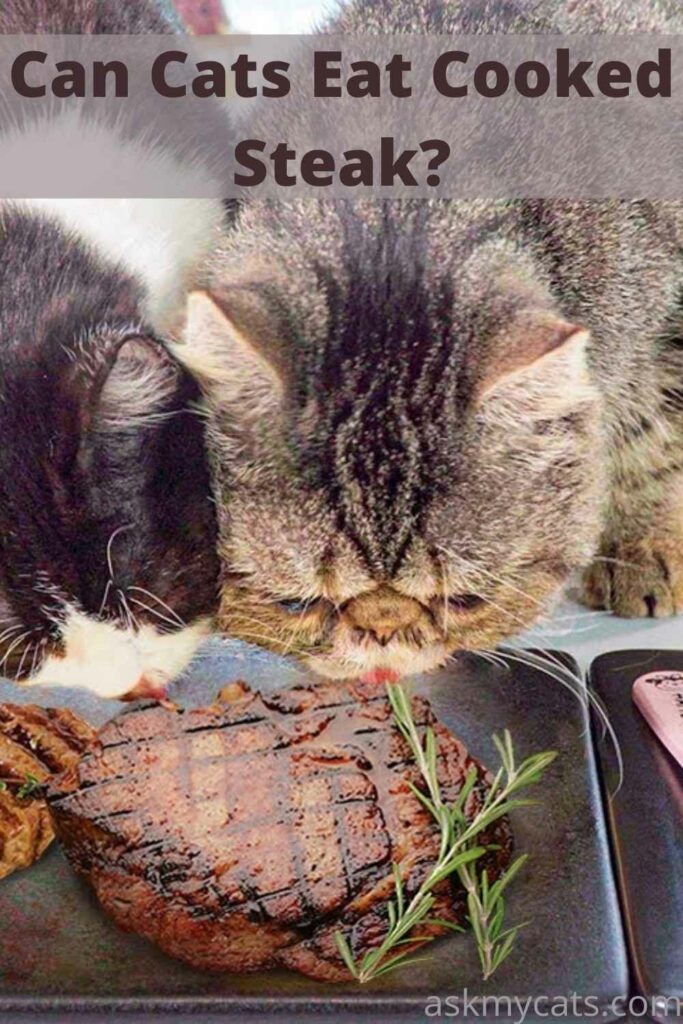Many people often relate steak or any other kind of meat with various illnesses like heart disease, obesity, and even cancer. The health risks linked with eating steak are, for the most part, justified.
There’s no shortage of evidence that suggests that overeating meat raises the risk of various chronic ailments.
However, is this true for your feline friend? Can cats eat steak?
Yes is the straightforward answer to this question. In moderation, your cat can eat steak. Red meat is, in fact, one of the safest meat choices for your pet. Cow’s flesh contains no known toxins for cats, is easily digestible, and does not contain the same heavy metal pollutants that may be found in many types of fish.


Give Your Cat the Perfect Day
Get the Free Ebook!
Can I Give Steak To My Cat?
Yes, you can give steak to your cat; make sure that it is in moderation.

A steak is a cut of meat that has been sliced across the muscle fibres and may include a bone.
It’s usually grilled, but it’s also good pan-fried. Steak can also be minced and made into patties, as in steak and kidney pie, cooked in sauce, and hamburgers.
Steaks are frequently cut from animals, such as bison, camel, goat, horse, kangaroo, sheep, pigs, reindeer, turkey, deer, zebu, and fish, particularly salmon and giant fish like swordfish, shark, and marlin.
Chops are used to describe certain kinds of meat, such as pork, lamb and mutton, chevon, and veal.
Steak is a common way to prepare cured meats like gammon.
Steak is not a problem for cats. While medical professionals typically advise against eating red meat, it appears to be fine for our feline companions.
Steak is entirely safe for cats to eat. It also has several health benefits that your kitty can take advantage of. But, like with any cuisine, there are a few things to keep in mind while feeding steak to your cat.
Can Cats Eat Steak Fat?
No, steak fat should not be given to cats as it can cause intestinal upset, vomiting and diarrhoea.
Giving your cat a few scraps from your plate, especially fat that you’ve chopped off from your steak, might be very tempting.
Although your cat is sure to enjoy this sweet treat, there are a few fundamental reasons why you should not give in to his pleading looks.
Obesity in cats is on the rise, and extra pounds can lead to a shorter lifetime for many cats unless their owners take responsibility and keep track of how much food they consume.
While a tiny bit of fat from your steak tonight may not seem like much, think about how many times you’ve done it before. How many times have you given your cat something he didn’t need, such as a treat or a piece off your plate?
You’ll not only be encouraging your cat to beg, which is unpleasant enough on its own, but you’ll also be contributing to their dangerous weight gain.
Cats’ bodies require meat for nutrition, but they are not equipped to handle cooked fats efficiently. These harmful fats can cause your cat to gain too much weight and may cause her to develop feline diabetes or heart disease.
Fat and bones removed from meat and bones are frequently seen in table scraps. Cats may be at risk from both fat and bones.
Fat, both cooked and raw, can irritate the intestines, resulting in vomiting and diarrhoea. A cat, on the other hand, can choke on a bone.
Bones can also splinter and block your cat’s digestive system or slash the inside of his stomach.
As a good cat owner, it is your responsibility to ensure that your cat is only eating foods that will properly nourish her body. Feeding your cat scraps from your dinner, especially fatty bits, is not a good idea.
If you wish to give him meat, cut up a few pieces of lean meat while it’s still raw and place them in your cat’s food bowl. This is a delicious treat that your cat will love.
Can Cats Have Raw Steak?
Yes, cats can have raw steak. However, the raw steak should be given after 20 weeks, and prior to that, their immune system is not as strong.

The use of a raw diet for cats is a contentious issue.
With benefits and drawbacks on both sides of the debate, it’s no surprise that experts have yet to come up with a solid answer to the topic of whether cats should consume raw steak or any other raw meat.
Raw steak is safe for cats to consume. Raw cat food supporters frequently point out that such meal options allow cats to consume food that they are biologically designed to digest.
After all, no one is preparing the mouse for a wild cat that has just caught it.
Some argue that the main benefit of feeding raw steak to your cat is that it closely resembles the food that cats are evolutionarily evolved to eat.
Both cats and people can become ill as a result of parasites and germs found in uncooked meat.
On the other hand, Cats have a considerably shorter digestive track and a higher level of acidity in their stomach than humans, making infections or parasites spend less time in their system and hence are less likely to get them sick.
Purchase fresh raw steak, clean all surfaces that have come into contact with the raw steak, and thoroughly wash your hands or wear gloves when handling it to reduce the danger of contamination.
Can Cats Eat Cooked Steak?
Yes, cats can eat cooked steak, but it should be given in a limited amount only.

Cats are carnivores, to put it bluntly. For a robust heart, clear vision, and a healthy reproductive system, they must consume meat protein.
Cooked steak, chicken, turkey, and modest portions of lean deli meats are excellent protein sources.
Your cat may become ill if it eats raw or rotten meat. Don’t feed anything to your pet if you wouldn’t eat it.
All you have to do is make sure the meat is prepared in a way that is safe for cats to eat.
That involves cooking the meat at a high enough temperature to destroy any bacteria that may have affected it but low enough to preserve the essential nutrients.
Above all, any steak you intend to serve your cat should be prepared without excessive fat.
It’s worth noting that steak is already a high-fat dish. As a result, adding additional fat to it could cause your cat to develop a variety of health problems, including high cholesterol, heart disease, obesity, diabetes, and pancreatitis.
Aside from fats, avoid giving your cat meat that contains a lot of salt or spices like onions and garlic. While these components are typically included to enhance flavour, your cat may be harmed by large doses of salt or spicy foods.
Can Cats Eat Seasoned Steak?
No, seasoned steak must be avoided to give to cats as salt, and other spices could harm the cat.
Salt, sugar, pepper, vinegar, and a variety of other condiments are unhealthy for your cat. You should not share a steak with your cat, even if they enjoy a particular seasoning.
Onions, garlic, shallots, and scallions can harm red blood cells in your cat, causing anaemia.
When consumed in excessive quantities, these items are poisonous, although concentrated forms of onion or garlic can also be harmful. Therefore, giving your cat seasoned steak must be avoided.
Health Benefits Of Feeding My Cat Steak
The health benefits of feeding your cat steak are that it can boost your cat’s health because it contains iron, niacin, protein, selenium, zinc, and Vitamin B12.
Felines are carnivores by definition. Steak is high in nutrients. However, Never substitute your cat’s pet food with a steak-only diet if you want to make sure they don’t have any nutritional imbalances.
If you’re thinking of modifying your cat’s diet to solely contain whole foods, you should consult your veterinarian first.
While steak is suitable for cats, it won’t cover all of their nutritional demands, as well as pet food designed specifically for cats.
Many people attempt to avoid red meat as much as possible. Unlike humans, felines, on the other hand, are biologically intended to consume meat on a daily basis.
Iron, niacin, protein, selenium, zinc, and Vitamin B12 are just a few of the vitamins and elements found in lean, grilled steak that can help a cat’s health.
Cats will absorb these nutrients from the steak much more easily than they would from a plant-based meal, such as kale or spinach because their predecessors were all meat-eaters.
Green vegetables are a terrific source of nutrients for omnivores like us, but not so much for our feline pals.
Vitamin B12 in steak, also known as cobalamin, is essential for a cat’s health, including their neurological, immunological, and digestive tract.
While cats do not make B12 on their own, they can get it through their food, such as steak.
Sick or elderly cats may not be able to absorb enough Vitamin B12 from their kibble and could be fed steak to overcome this.
The small intestine, liver, stomach, and pancreas contribute to the absorption process, which is complicated. If one of these organs isn’t working correctly, your cat will absorb less Vitamin B12.
Vomiting, significant weight loss, lethargy, and diarrhoea are some of the Vitamin B12 deficiency symptoms in cats.
If your cat isn’t getting enough Vitamin B12, one of the finest things you can do is give her B12 tablets every day, along with some well-cooked, simple, lean steak.
Before changing her food or giving her supplements, consult your veterinarian.
Things To Consider When Feeding Your Cat Steak
The things to consider when feeding your cat steak is that it must be given in moderation, and fat and broth must be avoided.
While offering your cat steak as a treat or in moderation along with their regular feline diet is fine, you must serve them simple steak that is free of fat and bones.
Both of these meat products are potentially harmful to cats. Raw and unprocessed fat can cause a variety of health problems, such as diarrhoea, vomiting, and other gastrointestinal troubles.
Furthermore, excess fat (or, even worse, fat trimmings) can cause heart attacks, strokes, and high blood pressure. Cats can choke on bones, and splinters can injure them internally or impede their breathing.
Remember that most cats can survive on less than 300 calories per day. A single three-ounce serving of raw steak might have as many as 178 calories.
If you aren’t careful about how much steak your cat eats, they can quickly gain weight. Diabetes, arthritis, and even cancer can all be caused by obesity.
Frequently Asked Question
At which age should I start giving my cat steak?
Ans. You can start giving your cat steak once they are 20 weeks as, as prior to that, their immune system is not as robust.
Can cats eat pink steak?
Ans. Yes, cats can eat pink steak as It contains no known toxins for cats, is highly digestible and does not contain the same heavy metal pollutants that may be found in many types of fish.
Can cats eat raw bacon?
Ans. Yes, cats can eat raw bacon, but you should always consult your veterinarian before giving your cat any raw meat. Ensure the bacon is fresh and raw, not cured, and clean any surfaces or cooking utensils that have come into contact with the raw bacon.
Final words
In general, simple steak is fine in moderation. It is high in vitamins and minerals that cats require to thrive, such as Vitamin B12. However, limit the amount of steak you serve your animal and avoid giving them fat, bones, or raw meat.
If you are left with any unanswered questions, feel free to ask us in the comments section.
